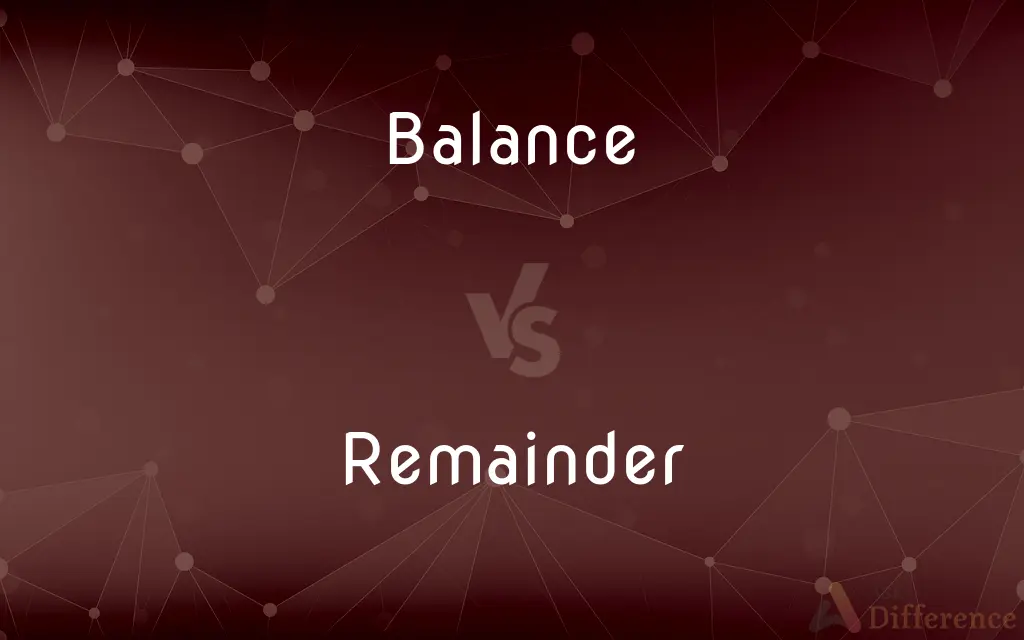Balance vs. Remainder — What's the Difference?
By Urooj Arif & Maham Liaqat — Updated on April 6, 2024
Balance refers to the amount left in a financial account, while remainder denotes what's left after division or subtraction.

Difference Between Balance and Remainder
Table of Contents
ADVERTISEMENT
Key Differences
Balance is a financial term indicating the total amount of money present in an account at any given time. It reflects all transactions, including deposits and withdrawals, and is key in budgeting and financial planning. The remainder, however, specifically relates to the quantity left over after performing an operation, such as division or subtraction, and is used in both mathematical and general contexts to denote what is left after a portion has been removed or allocated.
While a balance can change due to various transactions or adjustments in an account, signifying an ongoing calculation of funds, the remainder is the result of a specific mathematical operation, fixed once the operation is completed. For example, the balance in a savings account fluctuates with each deposit or withdrawal, whereas the remainder of a division operation is the portion that does not evenly divide into the divisor.
Maintaining a healthy balance in financial accounts is crucial for effective money management, implying a continuous process of monitoring and adjusting based on financial activities. The concept of the remainder is more static, representing a one-time calculation outcome without the implication of future changes.
The use of balance is widespread in financial discussions, accounting, and everyday financial management, encompassing a broader scope than the remainder, which, while applicable in various contexts, is primarily mathematical or descriptive of left-over quantities.
Comparison Chart
Definition
The amount of money in an account after all transactions
The quantity left after division or subtraction
ADVERTISEMENT
Context
Financial, accounting
Mathematical, general
Nature
Dynamic, changes with transactions
Static, result of a calculation
Usage
Reflects ongoing financial state
Denotes a specific leftover quantity
Implication
Ongoing monitoring and management needed
One-time calculation without future changes
Compare with Definitions
Balance
The remaining part of something in more general terms.
The balance of the day was spent reading.
Remainder
What is left after part has been used, removed, or subtracted.
The remainder of the cake was saved for later.
Balance
The current total amount of money in a financial account.
After paying the bills, the balance in her checking account was $500.
Remainder
A term in algebra denoting the difference between a polynomial and its division by another polynomial.
When dividing polynomials, the remainder theorem helps find the remainder.
Balance
A device for weighing - metaphorically used in financial balances.
The old-fashioned balance at the market is always accurate.
Remainder
In legal and real estate, the interest left in an estate after the termination of a prior estate.
The remainder of the property goes to the children after the life estate ends.
Balance
Equilibrium or steadiness in various contexts.
She strives for a balance between work and leisure.
Remainder
Something remaining as a residue.
The remainder of his estate was donated to charity.
Balance
The difference between such totals, either on the credit or the debit side.
Remainder
The amount left over in a division operation that cannot be evenly divided.
Dividing 7 by 3 gives a quotient of 2 and a remainder of 1.
Balance
See Libra.
Remainder
In mathematics, the remainder is the amount "left over" after performing some computation. In arithmetic, the remainder is the integer "left over" after dividing one integer by another to produce an integer quotient (integer division).
Balance
A weighing device, especially one consisting of a rigid beam horizontally suspended by a low-friction support at its center, with identical weighing pans hung at either end, one of which holds an unknown weight while the effective weight in the other is increased by known amounts until the beam is level and motionless. Also called scale.
Remainder
A part of something that is left over when other parts have been completed, used, or dealt with
The remainder of the year
Leave a few mushrooms for garnish and slice the remainder
Balance
A state of equilibrium or parity characterized by cancellation of all forces by equal opposing forces.
Remainder
A property interest that becomes effective in possession only when a prior interest (created at the same time) ends.
Balance
The power or means to decide
Matters that fell outside the judge's balance.
Remainder
Dispose of (a book left unsold) at a reduced price
Titles are being remaindered increasingly quickly to save on overheads
Balance
A state of bodily equilibrium
Thrown off balance by a gust of wind.
Remainder
Something left over after other parts have been taken away.
Balance
The ability to maintain bodily equilibrium
Gymnasts must have good balance.
Remainder
The number left over when one integer is divided by another
The remainder plus the product of the quotient times the divisor equals the dividend.
Balance
A harmonious or satisfying arrangement or proportion of parts or elements, as in a design.
Remainder
The number obtained when one number is subtracted from another; the difference.
Balance
An influence or force tending to produce equilibrium; counterpoise.
Remainder
A book that remains with a publisher after sales have fallen off, usually sold at a reduced price.
Balance
The difference in magnitude between opposing forces or influences.
Remainder
To sell or dispose of as a remainder.
Balance
Equality of totals in the debit and credit sides of an account.
Remainder
A part or parts remaining after some has/have been removed.
My son ate part of his cake and I ate the remainder.
You can have the remainder of my clothes.
Balance
Something that is left over; a remainder.
Remainder
(mathematics) The amount left over after subtracting the divisor as many times as possible from the dividend without producing a negative result. If n (dividend) and d (divisor) are integers, then n can always be expressed in the form n = dq + r, where q (quotient) and r (remainder) are also integers and 0 ≤ r < d.
17 leaves a remainder of 2 when divided by 3.
11 divided by 2 is 5 remainder 1.
Balance
(Chemistry) Equality of mass and net electric charge of reacting species on each side of an equation.
Remainder
(mathematics) The number left over after a simple subtraction
10 minus 4 leaves a remainder of 6
Balance
(Mathematics) Equality with respect to the net number of reduced symbolic quantities on each side of an equation.
Remainder
(commerce) Excess stock items left unsold and subject to reduction in price.
I got a really good price on this shirt because it was a remainder.
Balance
A balance wheel.
Remainder
(legal) An estate in expectancy which only comes in its heir's possession after an estate created by the same instrument has been determined
Balance
To determine the weight of (something) in a weighing device.
Remainder
Remaining.
Balance
To consider and compare or assess
Balanced the pros and cons before making a choice.
Remainder
To mark or declare items left unsold as subject to reduction in price.
The bookstore remaindered the unsold copies of that book at the end of summer.
Balance
To bring into or maintain in a state of equilibrium.
Remainder
Anything that remains, or is left, after the separation and removal of a part; residue; remnant.
If these decoctions be repeated till the water comes off clear, the remainder yields no salt.
Balance
To act as an equalizing weight or force to; counterbalance.
Remainder
The quantity or sum that is left after subtraction, or after any deduction.
Balance
To compute the difference between the debits and credits of (an account).
Remainder
Remaining; left; left over; refuse.
Which is as dry as the remainder biscuitAfter a voyage.
Balance
To reconcile or equalize the sums of the debits and credits of (an account).
Remainder
Something left after other parts have been taken away;
There was no remainder
He threw away the rest
He took what he wanted and I got the balance
Balance
To settle (an account, for example) by paying what is owed.
Remainder
The part of the dividend that is left over when the dividend is not evenly divisible by the divisor
Balance
To bring into or keep in equal or satisfying proportion or harmony.
Remainder
The number that remains after subtraction; the number that when added to the subtrahend gives the minuend
Balance
Mathematics & Chemistry To bring (an equation) into balance.
Remainder
A piece of cloth that is left over after the rest has been used or sold
Balance
To move toward and then away from (a dance partner).
Remainder
Sell cheaply as remainders;
The publisher remaindered the books
Balance
To be in or come into equilibrium.
Balance
To be equal or equivalent.
Balance
To sway or waver as if losing or regaining equilibrium.
Balance
To move toward and then away from a dance partner.
Balance
(uncountable) A state in which opposing forces harmonise; equilibrium.
Balance
(uncountable) Mental equilibrium; mental health; calmness, a state of remaining clear-headed and unperturbed.
Balance
Something of equal weight used to provide equilibrium; counterweight.
These weights are used as a balance for the overhanging verandah
Blair thought he could provide a useful balance to Bush's policies.
Balance
A pair of scales.
Balance
(uncountable) Awareness of both viewpoints or matters; neutrality; rationality; objectivity.
Balance
(uncountable) The overall result of conflicting forces, opinions etc.; the influence which ultimately "weighs" more than others.
The balance of power finally lay with the Royalist forces.
I think the balance of opinion is that we should get out while we're ahead.
Balance
(uncountable) Apparent harmony in art (between differing colours, sounds, etc.).
Balance
(accounting) A list accounting for the debits on one side, and for the credits on the other.
Balance
(accounting) The result of such a procedure; the difference between credit and debit of an account.
I just need to nip to a bank and check my balance.
Balance
(watchmaking) A device used to regulate the speed of a watch, clock etc.
Balance
The remainder.
The balance of the agreement remains in effect.
The invoice said he had only paid $50. The balance was $220.
Balance
Libra.
Balance
(transitive) To bring (items) to an equipoise, as the scales of a balance by adjusting the weights.
Balance
To make (concepts) agree.
Balance
(transitive) To hold (an object or objects) precariously; to support on a narrow base, so as to keep from falling.
I balanced my mug of coffee on my knee.
The circus performer balances a plate on the end of a baton.
Balance
(transitive) To compare in relative force, importance, value, etc.; to estimate.
Balance
To move toward, and then back from, reciprocally.
To balance partners
Balance
(nautical) To contract, as a sail, into a narrower compass.
To balance the boom mainsail
Balance
(transitive) To make the credits and debits of (an account) correspond.
This final payment, or credit, balances the account.
To balance a set of books
Balance
(intransitive) To be in equilibrium.
Balance
(intransitive) To have matching credits and debits.
Balance
To weigh in a balance.
Balance
To hesitate or fluctuate.
Balance
An apparatus for weighing.
Balance
Act of weighing mentally; comparison; estimate.
A fair balance of the advantages on either side.
Balance
Equipoise between the weights in opposite scales.
Balance
The state of being in equipoise; equilibrium; even adjustment; steadiness.
And hung a bottle on each sideTo make his balance true.
The order and balance of the country were destroyed.
English workmen completely lose their balance.
Balance
An equality between the sums total of the two sides of an account; as, to bring one's accounts to a balance; - also, the excess on either side; as, the balance of an account.
I still think the balance of probabilities leans towards the account given in the text.
Balance
A balance wheel, as of a watch, or clock. See Balance wheel (in the Vocabulary).
Balance
The constellation Libra.
Balance
To bring to an equipoise, as the scales of a balance by adjusting the weights; to weigh in a balance.
Balance
To support on a narrow base, so as to keep from falling; as, to balance a plate on the end of a cane; to balance one's self on a tight rope.
Balance
To equal in number, weight, force, or proportion; to counterpoise, counterbalance, counteract, or neutralize.
One expression . . . must check and balance another.
Balance
To compare in relative force, importance, value, etc.; to estimate.
Balance the good and evil of things.
Balance
To settle and adjust, as an account; to make two accounts equal by paying the difference between them.
I am very well satisfied that it is not in my power to balance accounts with my Maker.
Balance
To make the sums of the debits and credits of an account equal; - said of an item; as, this payment, or credit, balances the account.
Balance
To arrange accounts in such a way that the sum total of the debits is equal to the sum total of the credits; as, to balance a set of books.
Balance
To move toward, and then back from, reciprocally; as, to balance partners.
Balance
To contract, as a sail, into a narrower compass; as, to balance the boom mainsail.
Balance
To have equal weight on each side; to be in equipoise; as, the scales balance.
Balance
To fluctuate between motives which appear of equal force; to waver; to hesitate.
He would not balance or err in the determination of his choice.
Balance
To move toward a person or couple, and then back.
Balance
A state of equilibrium
Balance
A scale for weighing; depends on pull of gravity
Balance
Equality between the totals of the credit and debit sides of an account
Balance
Harmonious arrangement or relation of parts or elements within a whole (as in a design);
In all perfectly beautiful objects there is found the opposition of one part to another and a reciprocal balance
Balance
Equality of distribution
Balance
Something left after other parts have been taken away;
There was no remainder
He threw away the rest
He took what he wanted and I got the balance
Balance
The difference between the totals of the credit and debit sides of an account
Balance
(astrology) a person who is born while the sun in in Libra
Balance
The seventh sign of the zodiac; the sun is in this sign from about September 23 to October 22
Balance
(mathematics) an attribute of a shape or relation; exact correspondence of form on opposite sides of a dividing line or plane
Balance
An equivalent counterbalancing weight
Balance
A wheel that regulates the rate of movement in a machine; especially a wheel oscillating against the hairspring of a timepiece to regulate its beat
Balance
Bring into balance or equilibrium;
She has to balance work and her domestic duties
Balance the two weights
Balance
Compute credits and debits of an account
Balance
Hold or carry in equilibrium
Common Curiosities
How important is it to keep track of account balances?
Tracking account balances is crucial for effective financial management, budgeting, and preventing overdrafts.
Can balance change over time?
Yes, a balance is dynamic and changes with every transaction made in an account.
What's the difference between a balance and a remaining balance?
They often mean the same, but "remaining balance" can emphasize what's left to be paid on a debt versus the total current value in an account.
How do balances affect credit scores?
High balances relative to credit limits can negatively affect credit scores, indicating higher credit utilization.
How can I find the remainder of a division quickly?
For simple divisions, mental math or a calculator can quickly provide remainders. For complex numbers, division algorithms may be needed.
How is remainder used in mathematics?
In mathematics, the remainder is the amount left over after division when one number cannot be evenly divided by another.
Is the remainder always a smaller number?
In division, the remainder is always less than the divisor. In subtraction, it's the left-over portion after the operation.
Can there be a remainder in financial transactions?
While the term "remainder" is less common in direct financial transactions, it can describe what is left after certain allocations or expenditures.
Are there tools to help manage account balances?
Many financial apps and banking services offer tools for tracking and managing account balances in real-time.
What does balance mean in banking?
In banking, balance refers to the amount of money currently available in an account, reflecting all credits and debits.
Can a remainder be zero?
Yes, in division, if a number divides evenly, the remainder is zero.
Is understanding balances and remainders important for everyone?
Yes, understanding these concepts is essential for personal financial literacy and mathematical proficiency.
What does it mean to balance a budget?
Balancing a budget means ensuring that total expenditures do not exceed income, maintaining financial stability.
What happens when you don't pay the full balance on a credit card?
Not paying the full balance can lead to interest charges on the remaining amount and potentially impact credit scores.
Can a negative balance be considered a remainder?
In financial contexts, a negative balance indicates debt or overdraft, not a remainder, as it signifies a deficit rather than a leftover portion.
Share Your Discovery

Previous Comparison
Rhyme vs. Song
Next Comparison
Crenation vs. PlasmolysisAuthor Spotlight
Written by
Urooj ArifUrooj is a skilled content writer at Ask Difference, known for her exceptional ability to simplify complex topics into engaging and informative content. With a passion for research and a flair for clear, concise writing, she consistently delivers articles that resonate with our diverse audience.
Co-written by
Maham Liaqat













































